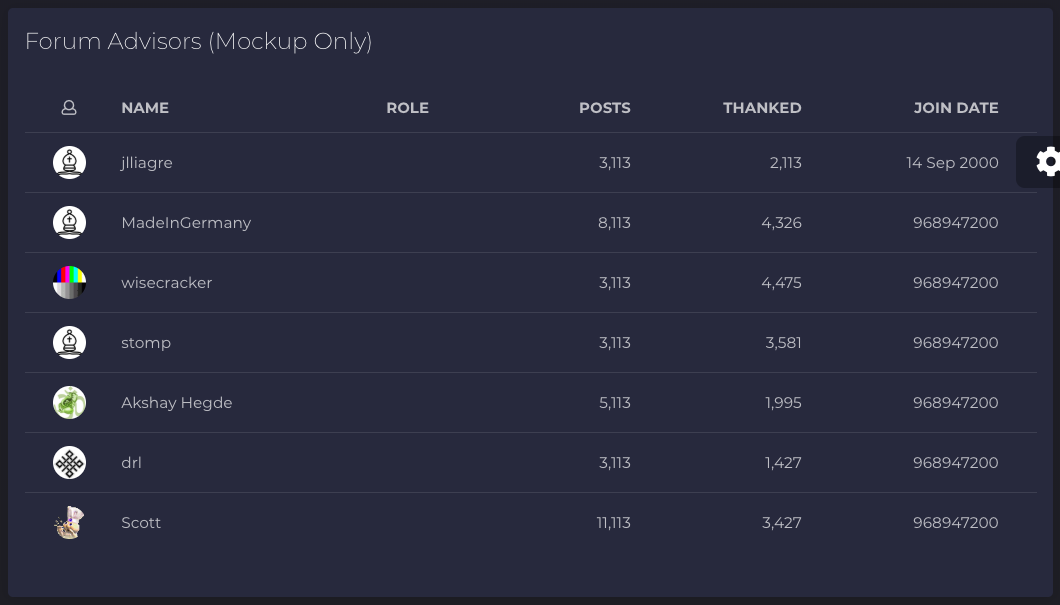|
|
Sponsored Content
Top Forums
Web Development
Sneak Preview: New UNIX.COM UserCP VueJS Demo
Post 303031051 by Neo on Thursday 21st of February 2019 01:05:31 AM
|
|
6 More Discussions You Might Find Interesting
1. UNIX for Dummies Questions & Answers
I'm trying to setup a test environment to test upgrading to Solaris 8 or 9. Though when I go to install the demo version of Sun1 (forte/sun workshop as named before) it'll still ask for a 20 hexidecminal password for just a demo. huh?
Ok so I added a 20 character thing in there it passed... (2 Replies)
Discussion started by: merlin
2 Replies
2. UNIX for Dummies Questions & Answers
I have been thinking about another shell scripting project using the Arduino Diecimila board.
I was going to make a kids level slow 8 channel Logic Analyser.
I thought about using the termiinal esc code graphics characters.
This is the test code using said terminal escape codes. I have only... (2 Replies)
Discussion started by: wisecracker
2 Replies
3. What is on Your Mind?
Was working on Vue.js and stumbled upon this beautiful Vue project by Kadin Zhang
Periodicity is a dynamic periodic table built with Vue.js that animates and graphs data to aid the visualization of chemical concepts.
The code is available on GitHub (2 Replies)
Discussion started by: Neo
2 Replies
4. What is on Your Mind?
Regarding the latest version of the UserCP prototype (version 0.63) I have made a lot of major changes, including
Added a "Posts Timeline" table for the recent posts, complimenting the non-table version earlier, which has been moved off the main menu (link at the bottom of the table).
Added a... (4 Replies)
Discussion started by: Neo
4 Replies
5. What is on Your Mind?
Update!
UserCP Screeching Frog 0.7485
Created a new page for uploaded a profile picture (profile pictures are different than avatar pictures).
https://www.unix.com/usercp/#/settings/other
https://www.unix.com/members/1-albums225-picture1158.png
... (0 Replies)
Discussion started by: Neo
0 Replies
6. What is on Your Mind?
Here is my second live video screencast (in my life, using Camtasia) with voice for the new usercp:
Overview of the Vue.js UserCP @UNIX.com
Shout outs to Don Cragun, Corona688, Rudi, Wolf, Made in Germany, stomp, Ravinder, Creative Tim, PubNub and others in the video. Thanks.
If you are... (1 Reply)
Discussion started by: Neo
1 Replies
LEARN ABOUT PHP
parse_url
PARSE_URL(3) 1 PARSE_URL(3) parse_url - Parse a URL and return its components SYNOPSIS
mixed parse_url (string $url, [int $component = -1]) DESCRIPTION
This function parses a URL and returns an associative array containing any of the various components of the URL that are present. This function is not meant to validate the given URL, it only breaks it up into the above listed parts. Partial URLs are also accepted, parse_url(3) tries its best to parse them correctly. PARAMETERS
o $url - The URL to parse. Invalid characters are replaced by _. o $component - Specify one of PHP_URL_SCHEME, PHP_URL_HOST, PHP_URL_PORT, PHP_URL_USER, PHP_URL_PASS, PHP_URL_PATH, PHP_URL_QUERY or PHP_URL_FRAGMENT to retrieve just a specific URL component as a string (except when PHP_URL_PORT is given, in which case the return value will be an integer). RETURN VALUES
On seriously malformed URLs, parse_url(3) may return FALSE. If the $component parameter is omitted, an associative array is returned. At least one element will be present within the array. Potential keys within this array are: o$scheme - e.g. http o$host o$port o$user o$pass o$path o$query - after the question mark ? o$fragment - after the hashmark # If the $component parameter is specified, parse_url(3) returns a string (or an integer, in the case of PHP_URL_PORT) instead of an array. If the requested component doesn't exist within the given URL, NULL will be returned. CHANGELOG
+--------+---------------------------------------------------+ |Version | | | | | | | Description | | | | +--------+---------------------------------------------------+ | 5.4.7 | | | | | | | Fixed host recognition when scheme is omitted | | | and a leading component separator is present. | | | | | 5.3.3 | | | | | | | Removed the E_WARNING that was emitted when URL | | | parsing failed. | | | | | 5.1.2 | | | | | | | Added the $component parameter. | | | | +--------+---------------------------------------------------+ EXAMPLES
Example #1 A parse_url(3) example <?php $url = 'http://username:password@hostname:9090/path?arg=value#anchor'; var_dump(parse_url($url)); var_dump(parse_url($url, PHP_URL_SCHEME)); var_dump(parse_url($url, PHP_URL_USER)); var_dump(parse_url($url, PHP_URL_PASS)); var_dump(parse_url($url, PHP_URL_HOST)); var_dump(parse_url($url, PHP_URL_PORT)); var_dump(parse_url($url, PHP_URL_PATH)); var_dump(parse_url($url, PHP_URL_QUERY)); var_dump(parse_url($url, PHP_URL_FRAGMENT)); ?> The above example will output: array(8) { ["scheme"]=> string(4) "http" ["host"]=> string(8) "hostname" ["port"]=> int(9090) ["user"]=> string(8) "username" ["pass"]=> string(8) "password" ["path"]=> string(5) "/path" ["query"]=> string(9) "arg=value" ["fragment"]=> string(6) "anchor" } string(4) "http" string(8) "username" string(8) "password" string(8) "hostname" int(9090) string(5) "/path" string(9) "arg=value" string(6) "anchor" Example #2 A parse_url(3) example with missing scheme <?php $url = '//www.example.com/path?googleguy=googley'; // Prior to 5.4.7 this would show the path as "//www.example.com/path" var_dump(parse_url($url)); ?> The above example will output: array(3) { ["host"]=> string(15) "www.example.com" ["path"]=> string(5) "/path" ["query"]=> string(17) "googleguy=googley" } NOTES
Note This function doesn't work with relative URLs. Note This function is intended specifically for the purpose of parsing URLs and not URIs. However, to comply with PHP's backwards com- patibility requirements it makes an exception for the file:// scheme where triple slashes (file:///...) are allowed. For any other scheme this is invalid. SEE ALSO
pathinfo(3), parse_str(3), http_build_query(3), http_build_url(3), dirname(3), basename(3), RFC 3986. PHP Documentation Group PARSE_URL(3)

